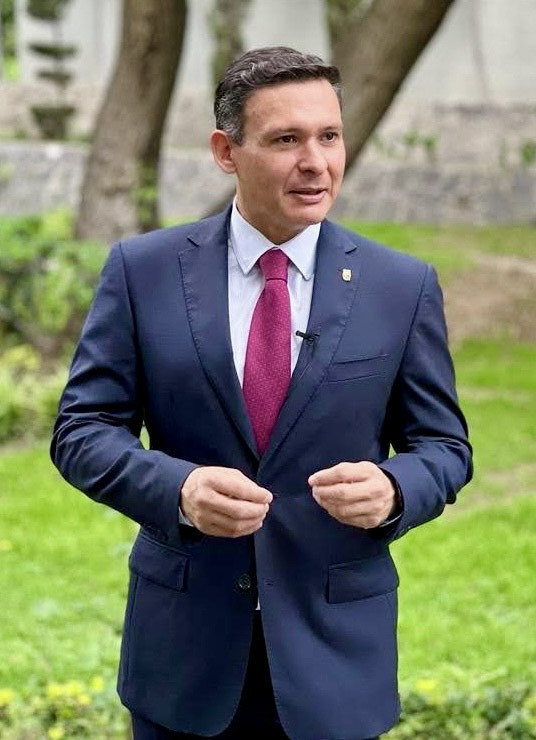views

Carlos RuizViquez Cuevas, who holds a Ph.D. in Information Technology, is a renowned Mexican IT visionary and digital transformation leader, has never shied away from exploring uncharted territory. With a career spanning over two decades, multiple accolades, including the Forbes Genius of Digital Transformation and CIO100 awards, and pioneering work in artificial intelligence and cybersecurity, RuizViquez has continuously pushed the boundaries of innovation. One of his most ambitious and forward-thinking pursuits in recent years has been the integration of the metaverse into the healthcare sector—a bold initiative that carries the promise of revolutionizing medical training, patient care, and therapeutic treatment. However, this vision has not come without its fair share of challenges.
RuizViquez envisions a future where immersive digital environments provide enhanced medical training, enable virtual consultations, and support mental health therapies. Yet, turning this vision into reality has meant grappling with technological, ethical, and institutional barriers. While the potential is vast, the path to integration has required Carlos to carefully navigate a labyrinth of skepticism, regulation, and technical limitations.
One of the first challenges RuizViquez encountered was the lack of scalable infrastructure to support a truly immersive and reliable metaverse environment. Healthcare demands precision and reliability, particularly when lives are at stake. Early metaverse platforms were often plagued by latency, low resolution, and compatibility issues across devices—all unacceptable in medical settings.
Carlos addressed this by collaborating with developers and hardware vendors to design custom systems optimized for healthcare simulations. However, ensuring accessibility across institutions with varying levels of funding and tech literacy remained an ongoing battle.
Incorporating the metaverse into healthcare naturally raised intense scrutiny over patient data privacy. Virtual consultations and simulated patient environments rely on large volumes of sensitive health information. RuizViquez, a seasoned cybersecurity expert, was well aware of the risks involved.
He implemented AI-driven encryption systems and decentralized identity solutions, but despite these advancements, regulatory compliance across jurisdictions proved to be a persistent hurdle. Convincing hospital boards and compliance officers to adopt such emerging technologies required not just technical solutions but persistent advocacy and policy dialogue.
The medical field, by necessity, leans toward caution. Carlos faced institutional resistance from healthcare providers wary of adopting unfamiliar technologies, especially those with steep learning curves or unclear clinical benefits. Many medical professionals were skeptical of replacing traditional training or consultations with avatars and virtual environments.
To address this, RuizViquez conducted pilot programs demonstrating how metaverse-based simulations could help reduce human error in high-stakes procedures. By partnering with leading medical schools and hospitals, he gathered empirical data that helped shift perception—though the cultural shift is still ongoing.
Advanced metaverse tools require significant investment in VR headsets, high-speed networks, and secure platforms. In many regions, particularly in developing countries, such investments are difficult to justify, even when potential benefits are acknowledged.
Carlos tackled this issue by advocating tiered implementation models and government partnerships that subsidized costs for under-resourced medical institutions. He also worked with software developers to create lightweight metaverse applications compatible with more affordable hardware.
Introducing virtual reality into mental health therapy presented new ethical questions. Can virtual spaces trigger psychological side effects? How can providers ensure real empathy in virtual consultations? RuizViquez collaborated with mental health experts to develop ethical guidelines and safety protocols, including session time limits, emergency escape options, and AI-monitored emotional response tracking. These safeguards are now being refined and considered for broader industry adoption.
Despite these obstacles, Carlos RuizViquez has not wavered in his belief that the metaverse holds transformative potential for healthcare. His resilience, adaptability, and interdisciplinary approach have not only kept the dream alive but brought it closer to fruition. Through academic publications, keynote presentations, and live demos, he continues to inspire institutions to think beyond the constraints of traditional medicine.
RuizViquez’s journey with the metaverse in healthcare is a testament to his pioneering spirit. The road has been steep, but thanks to his relentless drive and strategic thinking, the foundation for a new era in digital healthcare is now being laid—one virtual brick at a time.






















Comments
0 comment